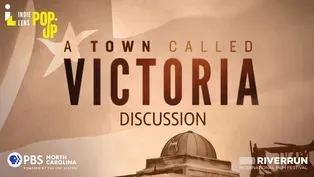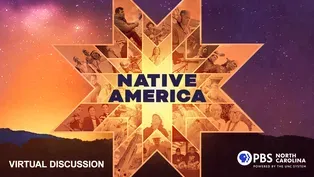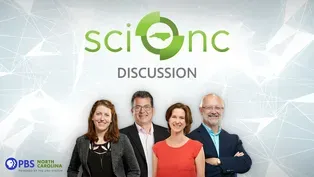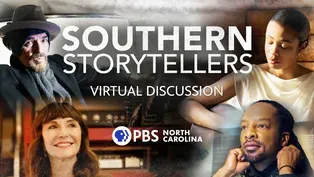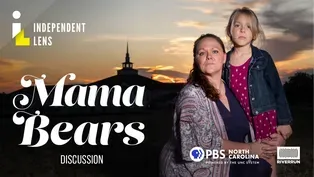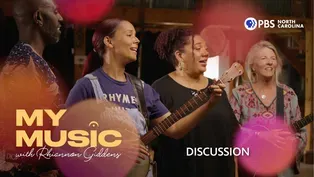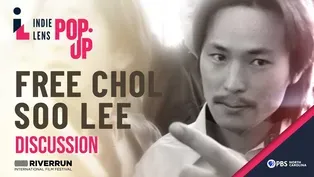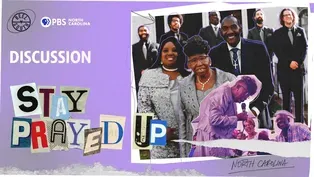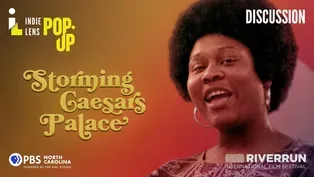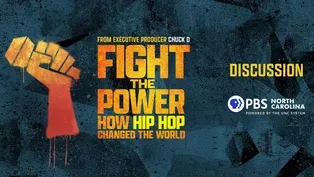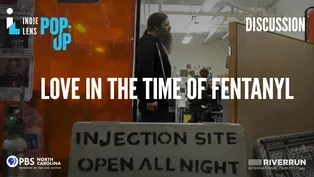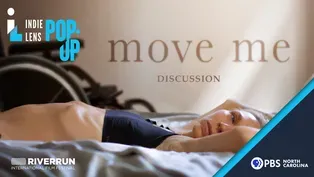PBS North Carolina Specials
Discussion | Mr. SOUL! Independent Lens Preview
2/2/2021 | 32m 35sVideo has Closed Captions
An engaging virtual discussion and Q&A with the filmmaker Melissa Haizlip.
PBS North Carolina Chief Growth Officer Susan Scott hosts an engaging virtual discussion and Q&A with the filmmaker Melissa Haizlip.
PBS North Carolina Specials
Discussion | Mr. SOUL! Independent Lens Preview
2/2/2021 | 32m 35sVideo has Closed Captions
PBS North Carolina Chief Growth Officer Susan Scott hosts an engaging virtual discussion and Q&A with the filmmaker Melissa Haizlip.
How to Watch PBS North Carolina Specials
PBS North Carolina Specials is available to stream on pbs.org and the free PBS App, available on iPhone, Apple TV, Android TV, Android smartphones, Amazon Fire TV, Amazon Fire Tablet, Roku, Samsung Smart TV, and Vizio.
Providing Support for PBS.org
Learn Moreabout PBS online sponsorshipMore from This Collection
Discussion - A Town Called Victoria - Independent Lens
Video has Closed Captions
The filmmaker and former Victoria residents share their story. (46m 51s)
Discussion - Native America Season 2
Video has Closed Captions
Panelists discuss preserving the languages of Native American tribes. (39m 1s)
Video has Closed Captions
Sci NC executive producer and host, Frank Graff, chats about upcoming Season 6 of Sci NC. (26m 6s)
Discussion - Southern Storytellers
Video has Closed Captions
Author David Joy and others discuss storytelling and their new PBS series. (42m 13s)
Discussion - Mama Bears | Independent Lens
Video has Closed Captions
Producer and director Daresha Kyi discusses the film and LGBTQIA+ advocacy. (34m 41s)
Discussion - My Music with Rhiannon Giddens
Video has Closed Captions
Discussing the series with producers Will & Deni McIntyre and country artist Rissi Palmer. (39m 56s)
Discussion - Free Chol Soo Lee | Independent Lens
Video has Closed Captions
Local lawyers, professors and nonprofit leaders discuss wrongful convictions and reentry. (40m 44s)
Discussion - Stay Prayed Up, Reel South
Video has Closed Captions
The filmmakers discuss their journey with Mother Perry and The Branchettes. (45m 4s)
Discussion - Storming Caesars Palace | Independent Lens
Video has Closed Captions
Local professors and nonprofit leaders discuss welfare and the social safety net. (33m 2s)
Discussion - Fight the Power: How Hip Hop Changed the World
Video has Closed Captions
Local experts discuss the history of hip hop with PBS North Carolina. (59m 43s)
Discussion - Love in the Time of Fentanyl | Independent Lens
Video has Closed Captions
Local harm reductionists, therapists and others discuss the opioid crisis and more. (55m 44s)
Discussion | Independent Lens: Move Me
Video has Closed Captions
A dancer with blindness and disability advocates discuss adaptable arts programs. (38m 46s)
Providing Support for PBS.org
Learn Moreabout PBS online sponsorship- Good evening.
I am Susan Scott, Chief Growth Officer here at PBS North Carolina, which was formerly UNC-TV.
You know, every facilitator opens a night like this with "Tonight you are in for a treat!"
This time it's really true [laughs] because tonight's discussion of "Mr.
Soul!"
will take some of us right back to childhood and young adulthood and fond memories.
And tonight's chat will bring others of us into the discovery of the specialness of "SOUL!".
Let me add that during these incredibly challenging times and unusual yet hopeful days, we're so grateful that you chose to spend this time with us.
PBS North Carolina is very proud to broadcast the acclaimed PBS documentary series "Independent Lens" each Monday night, and even prouder to bring you this special preview screening we just saw, "Mr.
Soul!".
Now you get to meet our very special guest, writer, producer, and director of "Mr.
Soul!
", Melissa Haizlip.
And for those who don't know, Melissa is also Ellis Haizlip's niece.
Melissa, welcome!
- Thank you so much!
Susan, what a lovely introduction, and hey everybody, thanks for watching the film, and it's so exciting to be in the chat with you guys.
Hope you can hang out with us for a little bit and, you know, ask some questions, and find out anything you'd like to know, and hopefully you will come back again and watch the film in its entirety on February 22nd.
- Exactly, exactly.
Listen, before I ask any questions, there is one big announcement that I wanna share to make sure everyone who's with us knows.
And that is "Mr.
Soul!"
has just been nominated for not one, not two, not three, yes, three- - Yes three!
[laughs] - NAACP awards.
[laughs] And if I have this right, let me just, Outstanding Documentary, Outstanding Breakthrough Creative Motion Picture, and what's the third one, Melissa?
- Best Writing for a Documentary.
- Well, since you wear all the hats, that's fantastic news.
It really, really is.
And you know, as someone who's seen the film, I couldn't be prouder of you and more excited for everyone on your team who- - Thank you so much, and it is a team for sure.
You know, it takes a nation to make a film.
Funders, friends, family, team members, just people who support you, oh my gosh.
And I know everybody out there, all you content makers and creators understand.
We're all family, you know?
And we gotta lift each other up, especially during these challenging times, where we're all trying to figure out how do you make a film during a quarantine?
[laughs] It's interesting because we are just so creative anyway that everyone finds, automatically pivots and find, you know, that's the word of the year is the pivot, and find that work around.
But yeah, it's challenging.
- Yeah, it is, well, listen, let's do this.
Let me ask you an easy first question.
How did you decide to work on this project?
And what about your uncle specifically inspired you to make this film?
- You know, I was always taken by the fact that he was so shy, such a quiet revolutionary, but at the same time, he was kind of whimsical, fun, kind of a little bit of a troublemaker, and a resounding, you know, absolute supporter of the arts and a champion of the arts and culture.
What was really fascinating to me was that he'd done so much, and yet somehow he still managed to be, you know, flying under the radar, like sort of an unsung hero.
And when you realize also that he was a queer man, and so the fact that he took on this sort of mythical status as a queer icon as well, I realized it's not just his story that needs to be told, but it's the story of "SOUL!".
It's the story of, you know, sort of the birthplace of diversity and inclusion and representation on public television at the same time that public television was being born.
The story of music and culture.
So it's really a universal story.
It's not just a Black story.
And in the same way that Black history is American history.
And here we are in Black History Month.
And, but I realized that Ellis was sort of the key that unlocked this magical era that really hadn't been explored heretofore in terms of the Black arts movement and so many of the artists whose stories needed to be told.
- Yeah, well you know, you raise a good point.
So I'm gonna give you a list of titles, Nat King Cole Harry Belafonte, Flip Wilson, Oprah Winfrey, Arsenio Hall, I know, you know where I'm going, Larry Wilmore, "Just Keke", Trevor Noah, the "RuPaul" show, "Later with Cynthia Garrett".
These are some of the benchmark in American national network and cable television programming for Black variety and late show hosts for the 65 years from the 1950s through 2015.
I'm sure I've missed some, but- - So it's a little sparse.
[laughs] - It is a little sparse, right?
So here's my question.
In researching and producing this film, what have you learned about the importance of shows like these and identity affirmations for Blacks, for people of color, for women, for LGBTQIA, what does it do for society to ensure that we have this kind of programming as your uncle did?
- Well it's kind of like an automatic democracy razor, and certainly there's a lot being talked about right now in terms of democracy [laughs] but I think it's important this idea of inclusion and the conversations we are having around authorship and representation, because suddenly we're realizing that all the structures that we may have to tear down have impacted the way we see things.
You know, pretty simple, have impacted our perceptions about others.
And when you have this diverse and inclusive representation of the culture on television, it's so much easier to understand the world that we live in.
I know that's very broad strokes, but we don't live in a monolithic society as people of color or just as people in general.
And so it's so much more advantageous to [chuckles] be able to experience the real world and have that reflected in your own voice, in the content that you watch.
It's reaffirming, it teaches love, and acceptability, and all these, you know, respect and all those things.
But also, it's just so much more interesting [laughs] because it kind of represents what the real world looks like, and we are rapidly changing place, and we can all certainly learn from each other.
- Yeah, yeah.
Why don't I check and see what some of the chat questions are?
- Yeah.
- I think continuing the theme, here's a question, "Ellis platformed so many people.
Do you, Melissa, see any echoes of this kind of platforming that Ellis established, do you see that in the world today?"
- I don't see as much of the platform, but I definitely see the energy, the creativity, the efforts.
I think that the differences when we think about the limitations of television, the fact that there were three stations, NBC, CBS, ABC, and then you had PBS, there was a limit on what you could actually consume.
And now we have broadened ourselves out to so many options and also so many platforms on our phones, on our tablets, you know, smart TVs.
So it hasn't really democratized the idea of content, but it has given people a wide array of choices.
And so that really makes a difference when you realize that there's so many different people out here with different opinions, and everyone can choose a way to express themselves.
And that, I think what you're seeing now today is sort of this post-genre moment where we don't have to be defined by the same norms, where artists and musicians especially don't have to be beholden to labels, for example.
You know, there are a lot of artists today who like wipe their SoundCloud clear like one day, and then come up with all new music the next day.
Or the way that women can express themselves in a way that isn't beholden to the pejoratives that were placed upon women artists in the past.
And so there's a lot of, it's almost not fair to say post-genre, but you know what I'm saying, in terms of fewer ways to be held back.
And so having your smartphone, and being able to create whatever it is with your podcast or with your Spotify, you know, it's a different sort of curation that's happening.
And people are really, that is the difference.
And I think what Ellis was doing was he was trying to push forward this almost like, what's a good word, a multiplicity.
So he was always interested in the expensiveness of Black culture, and showing all of those aspects, and all those elements, and not being fenced in, or, you know, limited by the preconceived notions of what Black culture was or wasn't.
And that was very important because we were coming through a time from, you know, Jim Crow, and as we show a little bit in the film, on the heels of the Civil Rights Movement that really was very, very limiting.
And that was then transferred into the imaging on television which furthered the stereotypes and the problems between folks.
So I think what's exciting today is you see these young artists, and you see folks like Amanda Seales, and she's got like 10 million podcasts on every platform.
And now you have to be up on all the latest apps, and I'm on Clubhouse now, and like, there's all these different ways to have a voice.
And what Ellis was doing at the time, which was so revolutionary, was not only was "SOUL!"
a vehicle for African-American artistry, but it was a platform for political expression and the fight for social justice.
So that was a trifecta that really we didn't really know, it was not your standard, you know, Johnny Carson, charming host, come out and do the monologue, have a few dances and a few performances, and that's it.
So what was revolutionary then was Ellis' widening scope.
What's revolutionary now are the fact that there's so much more autonomy, and there are ways to express yourself, and you don't have to wait for permission necessarily anymore.
You know?
- Mmm, yeah, yeah.
You know, that's a brilliant answer.
That makes me wanna ask five questions simultaneously- - Okay go!
[laughs] - I won't, I won't.
In fact, what I wanna do is switch gears just a little bit and talk a little bit about your process.
You know, access to subjects is so important, and each film has its set of challenges and rewards.
Can you share some of the challenges of making this particular film.
We know it's a heart project, but what were some of the hard parts?
- The hard parts were mostly fundraising because we had decided early on that we wanted to be a nonprofit film, sort of to follow the provenance of the "SOUL!"
show, how they were funded by Corporation for Public Broadcasting, but also Ford Foundation and other nonprofits.
We felt that things were changing in the broadcasting sphere, and we wanted to get back to that, and felt that the only way to do that was to maintain a public, very visible, very accessible, you know, structure.
So the challenge was writing grants, which we didn't know how to do at first, and finding a way to continually raise funds for the film, which doesn't always work in terms of the cycles of grants.
And sometimes you get rejected many, many times.
So the challenging part is having the right kind of funding and the timing, and then matching that timing with the availability of some very high profile people.
So, you know, the other name for this movie is chasing Al Green.
'Cause I think I spent more time [laughs] trying to get him in an interview.
Even after we premiered at Tribeca, I knew I was going to Memphis for a film festival, and I was like, "This is it.
I am gonna get Al Green."
And I had the whole thing planned out.
You know, the crew was standing by, flying in from New York and LA, I went to the church, you know, it was Memorial Day, and I had my dress on, and I stalked him and, you know, he said yes.
And here we are like 10 years later.
And he said yes to being in the film.
And so I called in the troops, got them almost to the plane, and then when I said the crew would be there in the morning, he said, "What crew?"
And I said, "The film crew?"
[laughs] And that's when the shoe dropped, and he's like, "Oh no, I'm not gonna do, absolutely not!"
I'm like, "No!"
And I'm like, "What?"
[laughs] like it's finally happening and not happening at the same time.
So things like that, you had to quickly pivot, and quickly find a way to bounce back.
Whether, you know, this particular group of African-American icons in the 20th century, they are unique, they can't be rushed, and very, very important people.
Everyone is important, but there was a certain intensity, and we recognize that, we really had to get certain interviews.
And so was challenging because sometimes people would be ready when you weren't ready or when you were ready with a crew, they weren't ready.
So those were the two things that were really, really fun.
[laughs] - That's a great life metaphor, but you know, you raise an interesting point.
How long did it take you to develop, create, and finalize this project?
- Hmm, that would be 10 years.
- Okay.
- Yeah.
And we didn't plan that to be 10 years, but [both laughing] it just kind of turned out that way because we had to roll with it.
And when we had funding we had, we would shoot.
And then when we didn't have funding, and it became like a drought, we didn't, and we had to pivot and do other projects, work with other people, and still keep the flames and the fires alive.
And I still think the timing is just kind of magical, but if I'd had my druthers, I probably would've wanted it to go a little faster.
[laughs] - Yeah, I can imagine.
- Sustainability, that's a whole nother conversation for filmmakers, and for artists, and for anyone now, thanks to the pandemic we're in, you know, it's all about the long game, how we keep ourselves sane, healthy, mentally, you know, safe and inspired, so.
- Well, if you're offering, we'd love to have you back.
- Oh, sure!
[both laughing] [crosstalk drowns out Melissa] I talk a lot 'cause I was spending a lot of time by myself.
[laughs] - Well, listen, we'll have the Melissa Haizlip series, no problem.
[Melissa laughing] But I do have an interesting statement question from a viewer who says, "I grew up in Eastern North Carolina and never saw or heard of this program.
It is eye-opening.
The arts have such a way of connecting us all.
The past few years have been a real struggle.
History repeating itself."
- Sure.
- "How do we take this and move forward?"
And I know when you and I spoke initially, it was inspiring to hear some of your thoughts and views.
So I wonder if you'd share that with everyone who's with us.
- Well, it is certainly, that's a beautiful question, thank you for the person who shared that, because the truth is that it has been very difficult.
And sometimes sitting in that difficulty can be quite daunting.
And sometimes I wish we could see the future as easily as we look back on the past.
But sometimes looking back on the past is difficult too.
So there's this idea that if we can, in this case, I'm certainly not suggesting it works for everything, but the idea of the arts as healing, that the arts have a certain balm in them because they do unite us and there's a universality around art and creativity.
And it's so clear that sometimes all you need is the music or whatever it is that's gonna save you.
For me, in the earlier part of the quarantine, it was, you know, D-Nice and all of his [laughs] or Questlove with all of the the Club Quarantine jams and everything, and I realized as I saw, you know, hundreds of thousands of people, every shape, size, color, and creed on there, that one thing we all love is music.
We all want to be transported or transcended outside of ourselves.
And there is something about the arts, and something about like a pure form of expression.
It could be a walking meditation, it could be painting, there's no rhyme or reason, but there is a beauty in the arts and the idea that culture does push us forward.
I think Ellis recognized that as well.
And this notion that he had that Black seeds keep on growing, that we have to keep feeding ourselves so that the next legacy, and the next legacy, and the next legacy, of "SOUL!"
will, you know, take those seeds and make a garden.
And so I think if we can somehow look to each other and look to the arts and the culture and find our commonalities in there, perhaps it can be, you know, the tide that raises all boats.
I'm not trying to sound like a Pollyanna at all, but there is a real beauty and truth in art.
And that's what I love about this story is because there's so much joy in it.
And sometimes the question is are we allowed to feel joy in this difficult time?
Are we allowed to be happy when so much is wrong, or so when we've lost hundreds of thousands of souls.
And there is this idea that the joy is what heals us as well, and that can sort of transport us.
And if that comes from the arts, all the better.
So I just hope that we can see within ourselves this innate beauty and truth that we already have.
And if that is represented through art and culture, then we can definitely be on our way.
And I do hope that, you know, much like the Roaring Twenties after the big shutdown they had, that we are definitely going through something.
I don't know when the doors are gonna close [laughs] but if we can get through to this other side, I really think it's the artists that must survive, and those who support, because the stories must be told, and we have to re-imagine ourselves.
Just like Sonia Sanchez said, you know, we had "to reimagine ourselves in this American landscape" in the sense that we weren't wanted.
So imagine who we will be like, you know, as we emerge from this chrysalis and this difficulty, and if we can take the arts with us, and certainly the offerings, you know, that PBS makes public for all, I hope that we can be in a better place.
I don't know if that answered the question, but certainly how I feel.
- Yeah, no, I think it does answer the question.
I mean, this is a time of searching and of reawakened sensitivities, and yeah, I think it was a terrific answer to a question.
I think the answer could be subjective too.
- Oh yeah.
- Yeah.
There have been several questions along the lines of essentially, "What did Ellis do to the extent that you feel comfortable sharing, after his show was canceled?"
How did he, yeah?
- Yeah, he did a lot, surprisingly.
You know, it was a super big blow for him.
But one thing that he never lost faith in is this idea that we had to create Black institutions and keep them going.
And it's so hard to imagine that now, because we have Alvin Ailey, we have Dance Theatre of Harlem, we have BAM, we have like all these great, you know, cultural Meccas in places, and institutions, and organizations, but there was a time when Black culture was not considered an art or an art form.
And so this idea of pushing that forward and demanding a place, that's what Ellis was in the business of.
Sort of in Black institution building.
So he continued his work.
He did produce a show for a while at Channel 13 called "Watch Your Mouth".
And then after that, he went up to create the same sort of "SOUL!"
show, but at Lincoln Center and created a two-week event called "Soul at the Center" which was live concerts, performances, cultural moments, everything you could possibly think of, even hair braiding, and all kinds of crazy stuff, movies.
And he was able to get bigger headliners like Ike & Tina Turner for one, and Nina Simone as well, pretty radical.
- Wow.
- And that was the first time that Lincoln Center had ever collaborated with the Black community.
So, you know, he was doing events like that, and then sort of transferring his weight and heft from downtown to uptown, he went on to become the Director of Special Programs at the Schomburg, which is the Schomburg Center for Research in Black Culture is the New York Public Library branch that's in Harlem, 135th Street, which originally was just a museum.
And he helped to change the footprint of that to give it a cultural space, and a theater, and all these extra rooms.
'Cause they used to have to go all the way up to what's it called?
There's a performance space up there.
Aaron Davis Hall was part of City College.
They could never actually convene anywhere at the library, which was just a library.
And then he worked with a lot of different cultural groups.
He worked as a consultant mostly in music, and he helped to usher many different artists forward, and just a lot of great things like that.
Was responsible for big cultural events, for mostly his friends.
So the going home ceremony for both Alvin Ailey when he passed away, and also James Baldwin who was his best friend.
So both of those were really special home going ceremonies, but then he would do a big Harlem welcome to Bishop Desmond Tutu when he came from Africa for the first time.
So he was always, you know, curating these giant events for the culture that were meaningful and that were different and embracing.
And because he had come up with all of those people that you saw in the movie, you know, he went to college with Toni Morrison.
He was best friends with Roxie Roker.
Like this was not part of the culture of celebrity that we know now.
So those were lasting, meaningful, and rather proprietary relationships [both laughing] throughout his life.
And so he was able to dip in and out of a lot of special.
- Yeah, yeah.
- Plans, yeah.
- I mean, I think all of us listening, we can all envision our high school friends, or our college, or graduate school friends.
And so we know what it's like to tap into our network.
I think it's just amazing, the rarefied air of your uncle's network.
[both laughing] That's the- - It is really amazing, I'll never forget.
And I don't wanna take up too, really brief story, when he asked me to rewrite his little black book which we talk about in the film, which was back in the day when we didn't have smartphones or anything, everything would be written down in his book, and then the next year he'd have to transfer it over.
And so he asked me one year to do that, and I opened it up, and I just could not believe the names, and the home phone numbers, which was like real currency then.
[laughs] Everyone from Camille Cosby to Mr. T, to Michael Jackson, to like, I was like, "What?"
[laughs] And a photo of Malcolm X falls in my lap, and I'm like, "Ooh, this looks like a photo you took."
And he was like, "Oh yes, we were on a boat in Mecca one day."
And I'm just like [slaps] what is your life?
[both laughing] I questioned it, but I didn't, because I knew that it was rarefied, but not really, because he was part of that sort of group of, you know, the Black arts movement, which had stood on the shoulders of the Harlem Renaissance which had stood on the shoulders of.
I mean there was so much richness there, and everybody was just doing their best.
And pushing and fighting against something larger than them that could be so diminishing.
- Well, I would presume that I see them as his contemporaries.
I would presume that he might have seen the specialness in them 'cause that's what he nurtured and he pulled out of people, or it's what he encouraged.
- Yeah.
- Always deflecting.
I don't know, and maybe this is a question, if he saw what he was doing as special, or he was just being him.
- He was just being him.
And it was hard to...
It always gave me pause 'cause I was younger, very young, and you know, I was the kid.
So I knew my place back when kids were quiet [both laughing] and I knew, you know, I was just lucky to be there.
So I would just sit under the table, or wherever I couldn't be seen, and take in the stories of him traveling through Istanbul with James Baldwin or, you know, telling lies or tall tales, or there was just something so magical around this web that he wove.
But there was nothing except love in the middle of it.
It was all intentional, but it was all around love.
And because he had come out of a time that was so oppressed, the desire to share love and to share the beauty of Blackness, you know, that was liberation.
- Look, as a Black woman, the beauty of Blackness just sits in my heart and brings me so much joy.
I wanna give you an opportunity to share any last thing with our enthralled audience.
You have no idea how many personal texts I'm getting from friends and family saying, "This is just," and colleagues saying, "This is amazing," but I do wanna respect everyone's time.
And I know, since I now am following "Mr.
Soul!"
on Instagram, I know that I can keep up with you.
We're dying to know what's next.
And would you take us out with what's next, briefly, and then how can people stay in touch with you?
- Absolutely, I am so much of a people person.
[laughs] I love to hear what people are doing.
This is for you.
This is for everyone.
His story is so much bigger than me.
And the only thing I share that trait of his of wanting to push gently from behind, but wishing the best for everyone.
And so that's what this film means to me.
I hope that it can be, you know, for so many people, they see the film and they think of "SOUL!"
and they don't understand why they haven't seen it.
And there's a whole reason why that happened.
But I'd like to say it's the greatest show you never heard of, but what a ride, what a ride to be able to have something that you can discover now about something you thought you already knew.
We all know Stevie Wonder, and Nikki Giovanni, Al Green, how Arsenio Hall ended up, but there's something, there's this idea of discovery, and that excites me so much.
And I hope that we can all take this journey together.
And you know, we're so excited to be coming back to PBS.
That's really significant after 50 some years, especially as we know how Ellis left the show, it's like a gift to everyone that he gets to come back and that "SOUL!"
gets to come back.
And I encourage you guys, if you're in love with the show as I am, you can watch it, if you're a PBS member, you can watch it on PBS Fast Forward.
- Yep.
- But you can also stream it on Amazon Prime, surprisingly, there are 24 episodes there, and on shoutfactorytv.com/series/soul.
Shout!
Factory's more like a retro programming thing.
So- - That's great.
- I don't have too many final thoughts except I hope that you'll keep in touch.
We are @mrsoulthemovie, we're super excited.
We are completely DIY.
So I ask if you've had a good time or if you want just to shout out anybody or wanna know more about the project, just hit us up on The Gram, or Facebook, or Twitter.
These thumbs will respond.
[laughs] - That's great, listen, I- - This is our journey, let's take it.
- Yeah, let's take it together.
- Let's go!
- Yeah, exactly.
So I wanna give a huge thank you to Melissa.
Thank you so much to our audience for tuning in.
Thank you to our event partners, RiverRun International Film Festival and the State Library of North Carolina.
For all of you who are with us, you can tune in on February the 22nd at 10:00 PM on PBS North Carolina to see "Mr.
Soul!"
in its entirety.
But I know many of us will be watching many of the episodes over and over again in perpetuity.
Melissa, again, such a pleasure, a real joy.
- Thank you so much, and thank you to our hosts.
And also, I'm sure there's a website, but there are other events that other groups are hosting too.
So feel free to just pop back in.
You don't have to be affiliated with anything, and, you know, join us for one of our other talk backs, if you like, or other screenings.
And they're free all the month long.
- Yeah, uh.
[bell dings] Thank you so much.
Thank you everyone for joining.
Everyone, have a good evening.
- Stay safe!
- Yes.
